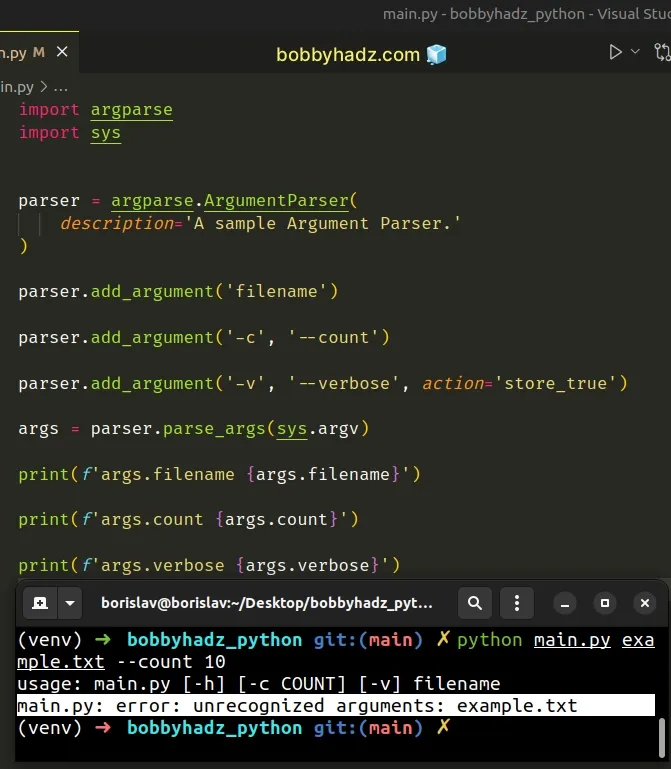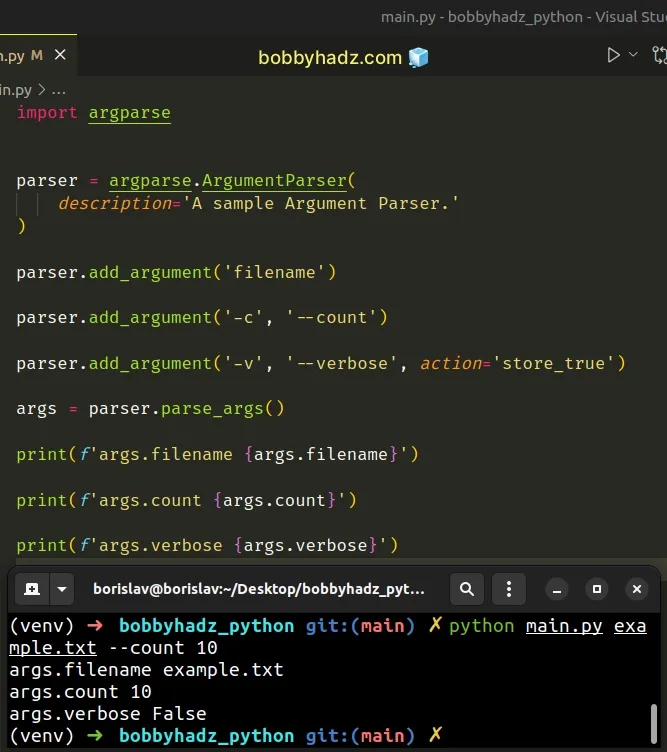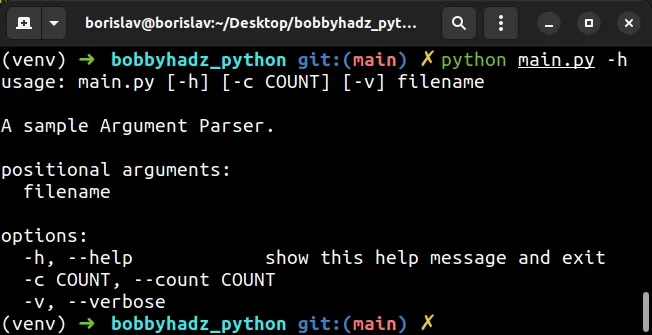Python argparse: unrecognized arguments error [Solved]
Last updated: Apr 13, 2024
Reading time·4 min

# Python argparse: unrecognized arguments error [Solved]
The Python argparse "unrecognized arguments" error occurs for 3 main reasons:
- Passing the
sys.argvlist in the call toparser.parse_args(). - Forgetting to supply a value for a boolean argument that is not initialized
with
actionset tostore_true. - Supplying misspelled or incorrect arguments when running the Python script.
# Passing the sys.argv list in the call to parser.parse_args()
The most common cause of the error is passing the sys.argv list in the call to ArgumentParser.parse_args.
Here is an example of how the error occurs.
import argparse import sys parser = argparse.ArgumentParser( description='A sample Argument Parser.' ) parser.add_argument('filename') parser.add_argument('-c', '--count') parser.add_argument('-v', '--verbose', action='store_true') # ⛔️ Should not pass sys.argv here args = parser.parse_args(sys.argv) print(f'args.filename {args.filename}') print(f'args.count {args.count}') print(f'args.verbose {args.verbose}')
The main.py file has a positional filename argument and --count and
--verbose arguments.
Suppose, I run the following command.
# ⛔️ main.py: error: unrecognized arguments: example.txt python main.py example.txt --count 10

I passed the example.txt value for the filename argument and set the
--count argument to 10.
Everything should work as expected, however, it does not because we passed
sys.argv in the call to parser.parse_args().
# ⛔️ Should not pass sys.argv here args = parser.parse_args(sys.argv)
Instead, remove the argument and call the method without any arguments.
import argparse parser = argparse.ArgumentParser( description='A sample Argument Parser.' ) parser.add_argument('filename') parser.add_argument('-c', '--count') parser.add_argument('-v', '--verbose', action='store_true') # ✅ removed sys.argv args = parser.parse_args() print(f'args.filename {args.filename}') print(f'args.count {args.count}') print(f'args.verbose {args.verbose}')
Now, I'll rerun the same command.
python main.py example.txt --count 10

If you pass sys.argv to parse_args() the name of the Python script is the
first item in the sys.argv list.
Therefore, it gets supplied as the filename positional argument and the value
we provided (example.txt) is an unrecognized argument.
Once you remove sys.argv from the parse_args() method call the error should
be resolved.
# ✅ removed sys.argv args = parser.parse_args()
# Make sure to set the action argument to store_true for boolean arguments
If you work with boolean arguments, set the action argument to store_true.
import argparse parser = argparse.ArgumentParser( description='A sample Argument Parser.' ) parser.add_argument('filename') parser.add_argument('-c', '--count') # 👇️ set action to `store_true` parser.add_argument('-v', '--verbose', action='store_true') args = parser.parse_args() print(f'args.filename {args.filename}') print(f'args.count {args.count}') print(f'args.verbose {args.verbose}')
When the action argument is set to store_true:
- If the
--verboseargument is not supplied, it gets set toFalse.

- If it is supplied without a value, it gets set to
True.

This way you don't have to explicitly set a value for boolean arguments.
There is also a store_false action, which means that:
- The argument is set to
Trueif not supplied. - The argument is set to
Falseif explicitly passed.
parser.add_argument('-v', '--verbose', action='store_true')
# Make sure you haven't misspelled arguments or supplied unexpected arguments
Make sure you haven't:
- Misspelled any of the arguments as argument names are case-sensitive.
- Supplied arguments that you haven't added via the
parser.add_argument()method.
Suppose we have the following Python script.
import argparse parser = argparse.ArgumentParser( description='A sample Argument Parser.' ) parser.add_argument('filename') parser.add_argument('-c', '--count') parser.add_argument('-v', '--verbose', action='store_true') args = parser.parse_args() print(f'args.filename {args.filename}') print(f'args.count {args.count}') print(f'args.verbose {args.verbose}')
If I now try to pass a Count argument, I'd get the error.
# ⛔️ main.py: error: unrecognized arguments: --Count 10 python main.py 'example.txt' --Count 10

The error is caused because we didn't define a --Count argument in our Python
script.
The argument we defined is spelled in all lowercase letters.
parser.add_argument('-c', '--count')
So the following command works as expected.
python main.py 'example.txt' --count 10
You should also make sure that you aren't supplying any arguments that you
haven't defined in your Python script via the parser.add_argument() method.
The easiest way to do this is with the python your_script.py -h command.
python your_script.py -h

As shown in the screenshot, the -h or --help option prints a helpful message
that describes what the Python program does.
The message shows that the program has a filename position argument.
It also has options:
-cor--count-vor--verbose
If you try to supply any other arguments when calling the program, you'll get the "unrecognized arguments" error.
You can also use the shorthand argument names.
python main.py example.txt -c 100 -v

We supplied a value for the -c (--count) argument but did not supply one for
the -v (--verbose) argument because it is a boolean.
This is how we defined the two arguments in our Python script.
parser.add_argument('-c', '--count') parser.add_argument('-v', '--verbose', action='store_true')
# Conclusion
To solve the Python argparse "unrecognized arguments" error, make sure:
- You haven't passed the
sys.argvlist in the call toparser.parse_args()method. - You haven't forgotten to supply a value for a boolean argument that is not
set with
action="store_true". - You haven't misspelled argument names when running your Python program.
# Additional Resources
You can learn more about the related topics by checking out the following tutorials:
- ValueError: malformed node or string in Python [Solved]
- Check the syntax of a Python script without executing it
- Mock multiple return values in a Python unit Test
- Python: Assert that Mock was called with specific Arguments
- Python: Sending multipart/form-data request with requests
- Python argparse: Pass a List as command-line argument
- Python argparse: Default value or Specified value
- Python: How to calculate the MD5 Hash of a File
- python.exe: can't find
__main__module in Path - How to exit an if statement in Python [5 Ways]
- -215:Assertion failed !_src.empty() in function 'cvtColor'
- OpenCV TypeError: Expected cv::UMat for argument [Solved]
- OMP: Error #15 Initializing libiomp5md.dll, but found mk2iomp5md.dll already initialized
- Error: filename.whl is not supported wheel on this platform

